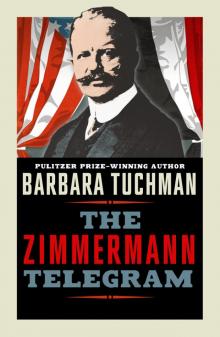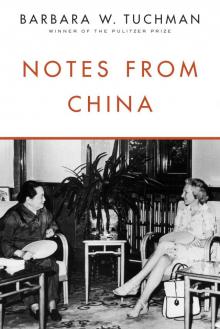- Home
- Barbara W. Tuchman
The Zimmermann Telegram Page 3
The Zimmermann Telegram Read online
Page 3
Intercepts from the repaired Brussels station were soon streaming into Room 40 in a code no one could make out. Reasoning from this failure that Brussels was using the German consular or diplomatic code, Ewing requested extramural help. Allied Intelligence had contact via neutral Holland with a Belgian agent in Brussels, and, after careful reconnaissance in the Rue de la Loi, where the wireless station was located, the agent was able to report back the interesting fact that a trusted code clerk in the German employ could be claimed as a British subject, having been born in Croydon, just outside London. With this clue, Szek’s sister—or mother—was located in England, acting as a governess. She was half Austrian, and her sympathies, like those of not a few full Austrians, were anti-German; she was without great difficulty persuaded to write a letter to her brother—or son—urging him to work for the country of his birth.
Even with this letter the Belgian agent was hard put to overcome Szek’s fears and reluctance; but at last, early in 1915, he agreed to steal the code. His initial proposal, however, to escape outright with it to England was worse than useless, as the Germans would then have known that the code had been taken. More persuasion was required to convince the trembling clerk he must copy it bit by bit. Painfully, half a column or a column at a time, he began to do it, taking three months before it was completed. At the beginning he passed on the slips to the agent as they were completed, but, becoming increasingly nervous, he grew balky and at the last moment refused to hand over the rest of the code. With it on his person as his only assurance against being left behind, he insisted that he and the agent leave together.
It was then April 1915. What happened next no one knows for certain, but Szek was never seen alive after the war. The copied sheets of code, however, did reach an English Intelligence agent in Holland, who forwarded them to their proper haven in Room 40. As to Szek, some have claimed that the Germans captured and shot him, but Szek’s father, after the war, accused the English of having done away with him in order to prevent the Germans from ever finding out that the code was taken. All we know is that his life was the cost of a code which the English got, which reached Room 40, and which the Germans went right on using.
Meanwhile, far away in Mesopotamia in February 1915, a man very different from Szek embarked in a small boat to sail down the Tigris on a grandiose mission—no less than to bring Persia into the war on the German-Turkish side. For years the Kaiser had hankered after his Berlin-to-Baghdad dream, and now his empire-builders saw themselves ending Anglo-Russian domination of Persia, swinging all Islam behind the Central Powers, bringing in Afghanistan after Persia, and ultimately marching triumphantly into India. More immediate strategy required the cutting of the Anglo-Persian pipeline.
The man in the boat who was to accomplish all this was Wilhelm Wassmuss, for many years German Vice-Consul at Bushire on the Persian Gulf. Like Lawrence over in Arabia, Wassmuss was part mystic, part fanatic, part charlatan, with a dash of hero. Like Lawrence, who was similarly trying to swing Turkey’s Arab subjects over to the British, Wassmuss fancied himself as the destined liberator of desert tribes whose flowing robes both he and Lawrence liked to wear and be photographed in. At Constantinople he had been briefed on the proposed mission (or more likely proposed it himself), and he was on his way back to Persia now, armed with several bundles of propaganda leaflets and an intimate knowledge of the country and its people.
Wassmuss left the Tigris forty miles below Kut-al-Imara, and crossed secretly into Persia. His first objective was the Bakhtiari tribes through whose territory ran the Anglo-Persian pipeline. On February 5 the pipeline was cut, though it seems doubtful if it was at the instigation of Wassmuss, for he would hardly have arrived in the area by then. Shortly afterward he passed through the market towns of Dizful and Shushtar, conferring with tribal chieftains and distributing his pamphlets inciting them to a jihad or holy war against Britain as the enemy of Islam’s Caliph, the Sultan of Turkey.
“Jihad! Jihad!” the whisper flashed through the bazaars, and from then on Wassmuss’s progress was about as secret as that of a fox in a henyard. A pounce upon his party by local gendarmes at Shushtar was foiled when he was warned and fled in time, but a hundred miles farther south, where he next appeared, at Behbehan, the local Khan decided to make his fortune by presenting Wassmuss to the British. First he invited Wassmuss to his home as his guest, then, with something less than traditional Moslem hospitality, locked him up under armed guard and sent off a messenger to the British at Bushire. The messenger, meeting a British detachment on the road, excitedly urged them forward to take his master’s prisoner into custody. The mounted officers of the detachment galloped into Behbehan, spent precious minutes exchanging the politenesses of Eastern protocol with the beaming Khan and arranging his reward, turned to take their prisoner, and found him gone. Rushing to the roof, they saw only a flurry of dust in the distance marking the escape, but down in the courtyard they found assorted bundles and baggage left behind.
These were dejectedly carried back with them to Bushire, where, when the pamphlets were read, the British blew loudly for the hunt. Because of Persia’s neutrality, a full-scale expedition was impossible, and Wassmuss again slipped through the hands of a small party that ran him to earth in a mud village. He made his way to Shiraz, the provincial capital, where he cut a wide swath of trouble, including a raid that resulted in the murder of the British Vice-Consul and the arrest and rather rude removal of the Consul and entire British colony to the coast.
In the course of these activities, one thing that marked Wassmuss’s progress was a seemingly disproportionate irritation over the loss of his baggage. Witnesses reported his bursts of anger, how he “lashed the tribesmen into transports of rage over the seizure of his pamphlets,” how he demanded to see the Governor at Shiraz, to whom he presented a formal protest and a claim for the return of his baggage. Since by now his purposes were known to all Persia as well as to the British, who had in the meantime raided the German consulate at Bushire and found in its files the full plans for his mission, his rage would appear to have been pointless unless the baggage contained something of extraordinary value known only to him. In any event, the baggage was beyond his reach, the British in Bushire having sent it on to London.
In London late that summer, Admiral Hall was listening to the account of a naval officer invalided home from the Persian Gulf. Naturally the tale of Wassmuss’s hairbreadth escapes and depredations figured largely. A private buzzer sounded inside Hall’s mind, and as soon as his visitor had left he sent aides scurrying through Whitehall, discreetly inquiring for the Wassmuss baggage. The day was ending when a call came through from one of the searchers, saying the baggage had been located in the cellar of the India Office, not three minutes’ walk away. It had not been touched since it came from Persia. Hall had it brought over, and, blinking like a semaphore, cut the rope holding it together. Carefully separating the papers, he found in their midst, as his sixth sense had told him he would, the German diplomatic code book, Code No. 13040.
Because Room 40’s records have never, with a few exceptions, been made public, and because Admiral Hall was refused permission to publish the autobiography he began in 1932, some dates are necessarily imprecise. Sometime between June and September 1915 can be fixed as the time when both the Szek and the Wassmuss codes reached Room 40. Whether the code obtained through Szek was also the diplomatic code, or another, has never been made clear. But in any event, Ewing’s staff now went to work on certain boxes of intercepts hitherto set aside as belonging to some category unknown but recognizably non-naval. No. 13040 was discovered to be one of the two codes used for communication between Berlin and Washington and, with Washington as the transferral point, between Berlin and all German missions in the Western Hemisphere.
With 13040 in his possession Admiral Hall could listen in on a remarkable correspondence—the uniquely informative reports from Washington of Ambassador Bernstorff to his government in Berlin. Since November 1916 these
had centered on Wilson’s efforts to bring the combatants to terms, revealing to Hall how obstinately set the American President was on preserving his country for the role of mediator, not belligerent. Without American belligerency, he well knew, the Allies could never win, would, in fact, despite all public protest to the contrary, soon be forced to negotiate.
Back at his desk, with the Zimmermann telegram in his hand, Hall believed he held the instrument that would puncture American neutrality—if it could be used. That “if” was his problem. He looked out across the open space of the Horse Guards Parade to the Renaissance bulk of the Foreign Office. His eyes picked out the second-story window that was the Secretary’s room, where he could picture Arthur Balfour at that moment, slouched back in his chair, his long legs stretched out beneath the table in the deceptively sleepy pose caricaturists had made famous through three governments. No one had ever seen Balfour animated off the tennis court. During the past year, when Balfour had been First Lord of the Admiralty, Hall had learned that very little ever ruffled the tall, cool, skeptical man who had once been Prime Minister, who cheerfully accepted any post and cared for none, and who, when escorted to the front, nonchalantly admired the bursting shells through his pince-nez. But Hall knew how desperately Balfour needed what Room 40 had found. Behind that serene façade he must be despairing of the waiting game he was forced to play with the United States, trying always suavely, imperceptibly, to nudge them over the edge of neutrality, yet without ever seeming to interfere.
At that moment Balfour’s need was urgent. England was spending £5,500,000 a day on the war, and cash and credit were as low as they could go. Six weeks ago the American Federal Reserve Board had warned its member banks against making long-term loans to belligerent governments or even short-term loans that were liable for renewal. It was Wilson’s way of trying to pressure the belligerents into a negotiated peace. Britain would never negotiate on any terms Germany could offer. But if the loan embargo was maintained, the collapse of the Allies would be a matter of months.
Admiral Hall was still staring fixedly at Balfour’s window. To go over there now and give Balfour the telegram to use as he liked in Washington would be to stake all on the likelihood that it would indeed bring the Americans in. But suppose it did not; he would have gambled the code and gained nothing. Personally he could not see how the Mexican-Japanese threat could fail of its effect, but if that mulish fellow in the White House remained still “too proud to fight,” he might sidestep it somehow. Hall had to be sure. He knew, as the Admiralty’s former First Lord, Winston Churchill, was to say later, that United States action depended solely on the workings of this one man’s mind. But who in England understood how that mind worked?
Hall wished desperately that he knew half as much about the White House as he did about the Wilhelmstrasse. To release the telegram meant risking the code; but to withhold the telegram meant throwing away the greatest triumph possession of the code could bring. He was in an agonizing dilemma. But he was determined to find a way out. Already half-formed schemes were tickling at the back of his mind, but they would take time, and time was running thin. He still had two weeks’ grace, for when the German order to resume unrestricted submarine warfare on February 1 became known, the United States might come in of its own accord, sparing him the necessity of using the Zimmermann telegram. If not, the telegram would have to be published, but in the meantime he might be able to cover Room 40’s tracks.
He hesitated, still held by the window opposite. Had he the right to keep this knowledge from his government? Years on the bridge had not only disciplined him to lonely decisions but given him a positive taste for them. He relished the responsibility of sole command. Turning his back on the window, he locked the dispatch—and with it two weeks of his country’s life—inside his private safe.
Then Admiral Hall sat down to work out a plan and to wait.
In Berlin they were waiting too—for the answer of Mexico and Japan. The league of these two nations in alliance with Germany was no last-minute makeshift but a plan that had evolved over many years since the moment when one of the most meddlesome sovereigns in history sat down in his palace to paint a picture.
Two
The Clever Kaiser and the Yellow Peril
LATE IN THE YEAR 1895, Kaiser Wilhelm had a revelation. He decided to commit it to paper in the form of a drawing, and when he had finished he was delighted with his artistry; the ominous Oriental figure dominating the picture was truly admirable. Suddenly it inspired in his fertile mind a title in one succinct and striking phrase: Die gelbe Gefahr!—the Yellow Peril.
Europe had been shocked earlier in that year by the quick, cut-and-slash victory of Japan over the ancient colossus of China. He alone, the Kaiser believed, grasped the significance of that event. Germany, France, and Russia had joined to force Japan to disgorge the larger part of her territorial gains and, as their price for thus coming to China’s aid, had taken most of these gains for themselves. Tsingtao and a naval base on Kiaochow Bay had fallen to the Kaiser’s share, but Wilhelm, who dealt in world dynamics, had been brooding over the rise of a new power in Asia. Vividly he saw its yellow hordes overwhelming Europe. “Under the glitter of the Christmas-tree candles,” as he described it to his cousin Nicky, the Czar of Russia, he drew his vision on paper and ordered the court painter, Hermann Knackfuss, to immortalize the sketch in a painting.
The picture showed a Buddha riding upon a dragon through a thunderous sky, leaving smoking cities in ruins beneath him as he advances upon Europe. Apprehensively watching this apparition are seven long-haired ladies in helmets and breastplates, representing the nations of Europe, of whom the foremost, Germania, with streaming blond locks beneath an eagle headdress, has drawn her sword and leans forward aggressively. Upon a height an archangel exhorts the ladies, “Peoples of Europe, guard your most precious possessions!”
Seized by the brilliance of his conception, the Kaiser caused copies to be engraved and presented to all the embassies in Berlin and to royal relatives of the various reigning houses and other distinguished persons. Wilhelm’s forays into personal diplomacy often dismayed the European chanceries, in some of which he was known as William the Sudden. Because he swung wildly between feelings of persecution and a rosy optimism, no one ever knew what to expect of the German Emperor. Bismarck said of him that “he wanted it always to be Sunday.” Wilhelm’s Byzantine court assisted him in this illusion by providing him with his own morning paper, in a special imperial edition of one, made up of carefully excerpted items from the world press, printed in gold.
Wilhelm was interested in gold-plated news only and disliked above all else those tiresome visits from ministers with their reports of inconvenient facts that did not fit in with his schemes. To avoid listening to them, the Kaiser would walk up and down, do all the talking himself, and dismiss the minister in twenty minutes. It was his task, he believed, to preserve the balance of Europe. Indeed, who but he in Europe was equal to it? Government officials from the Chancellor down were nothing but a pack of clerks. Europe needed a master mind if it was not to fall apart under the fumbling of these petty bureaucrats. Dynastic rulers were the only persons fit to manage international affairs, but really it was not fair the whole burden should fall upon him. Immediately the Kaiser, a man of volatile moods, felt deeply sorry for himself. Alone he shouldered this terrible burden, and no one realized how it weighed upon him. But he must bravely carry on, misunderstood, unappreciated though his efforts were. His fat uncle, King Edward of England, hated him as Wilhelm’s own mother, Edward’s sister, had hated him. Emperor Franz Josef belonged to a past generation, an ancient recluse who understood nothing of modern times. France had no ruler worth talking to. Anyway they were all conspiring behind his back, trying to encircle him. Only Nicky, the Czar, was his friend, neither clever nor strong like himself, but at least malleable. He had to hold on tightly to Nicky, wheedle him, flatter him, frighten him judiciously from time to time, for the Czar too they were t
rying to draw into this terrible encirclement.
He formed the habit of writing Nicky confidential letters, gossiping, advising, warning, admonishing, and signing himself “Yours Affectionately, Willy.” The letters, written in English (accounting for their occasional curiosities of spelling and grammar), were found in the Russian archives by the Bolsheviks after the war. The Czar’s replies are not extant, but the Kaiser evidently derived considerable pleasure from the correspondence. It charmed his ego to mold the Czar of all the Russias to suit his schemes.
Proud of his new naval base on the Pacific, Wilhelm now embarked on a program to make Germany a first-class naval power. Bismarck, content for Germany to dominate the land mass of Europe, had warned against collision with England on the seas, but the Kaiser wanted empire and took the fatal path. It occurred to him that Germany ought to have a foothold in the Americas, and the direct method he favored, as did the Count of Monte Cristo, was to buy one. In 1901 his roving eye alighted on the Santa Margarita Islands off the coast of Venezuela, but when Secretary of State John Hay learned that German warships were surveying the islands, he dropped a démarche in Berlin, and the enterprise was heard of no more.
If Colonel Hay thought his protest had stopped the German Emperor, he was wrong. The Kaiser had thought of something better than Venezuela: why not a piece of Mexico? On the desolate coast of Lower California, the thousand-mile-long peninsula which hangs down from California along the Pacific coast of Mexico, there was another Santa Margarita island, enclosing the superb natural harbor of Magdalena Bay. In 1902 an American lawyer practicing in London called upon Ambassador Joseph H. Choate with a startling piece of news which the Ambassador promptly reported to Secretary Hay. The lawyer told him, Choate wrote, that he had been approached by a German gentleman doing business in the City, “to draw options giving him the right to purchase the principal part of the peninsula of Lower California.” He did not disclose for whom he was acting, but after some weeks of transactions the American lawyer, who found he would be required to go to Mexico to obtain the concessions, insisted on knowing where the money was coming from for so extraordinary an adventure in real estate.

 Practicing History: Selected Essays
Practicing History: Selected Essays Stilwell and the American Experience in China, 1911-45
Stilwell and the American Experience in China, 1911-45 Bible and Sword: England and Palestine From the Bronze Age to Balfour
Bible and Sword: England and Palestine From the Bronze Age to Balfour The Guns of August
The Guns of August The Proud Tower: A Portrait of the World Before the War, 1890-1914
The Proud Tower: A Portrait of the World Before the War, 1890-1914 The Zimmermann Telegram
The Zimmermann Telegram A Distant Mirror: The Calamitous 14th Century
A Distant Mirror: The Calamitous 14th Century The March of Folly: From Troy to Vietnam
The March of Folly: From Troy to Vietnam The First Salute
The First Salute Notes From China
Notes From China Practicing History
Practicing History Stilwell and the American Experience in China
Stilwell and the American Experience in China First Salute
First Salute Bible and Sword
Bible and Sword